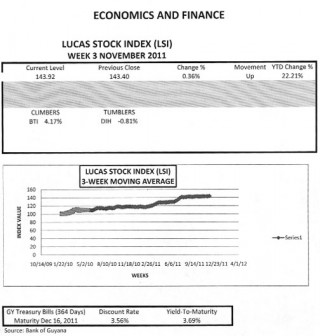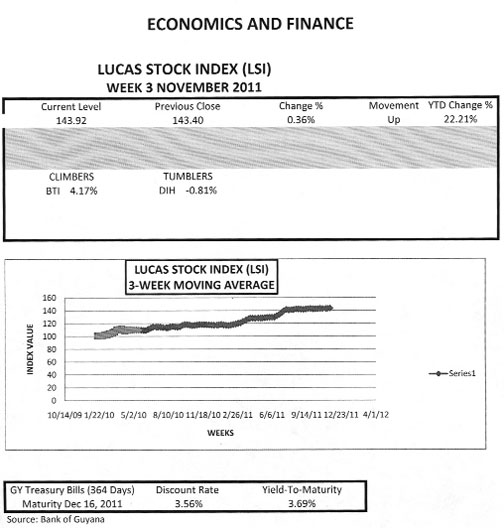Living Conditions
Quite recently, the World Bank, in a September update of an online report, observed that Guyana would not meet the goal of poverty eradication as required by the Millennium Development initiative. While the World Bank wished to be more upbeat about the economic situation in Guyana, it could not. The international financial institution knows that growth without jobs means nothing to anyone, especially those who are unemployed and impoverished. It is normal for as much as 20 percent of the population of Guyana to find itself in sleeping arrangements where more than 3, and as many as 12 persons, share a one bedroom unit. This information which was published by the Guyana Bureau of Statistics is confirmed by public servants with knowledge of the living conditions facing many Guyanese. Growth and development generally mean that people are better off; they have jobs and can take care of themselves. This is not the reality in Guyana and could be the basis of the personal decisions that will be made next Monday when Guyanese go to the polls.
Shortfall
What happens the morning after, and the days that follow, will matter as much as what happens on Monday November 28, 2011. The critical economic situation facing many Guyanese will still be present and will have to be addressed by whichever administration takes over. The problems in Guyana are many, but none could be more critical than the need to improve the quality of the labour force. Guyana is facing a skilled workforce shortfall that should frighten anyone who cares about people and the way they live. Less than 12 percent of the labour force has a post-secondary or university education. Recent surveys indicate that the available skilled force could be below nine percent. Existing data indicate that 62 percent of Guyanese, the majority of the labour force, have only a high school education. This means that the bulk of the labour force is not fully ready for industry and is without competitive skills. With poor skill sets, many Guyanese are limited to low-level or low-paying jobs on minibuses, in factories, restaurants, retail stores, sanitary services and on construction sites. Others are limited to temporary or transient jobs resulting in a one-time or periodic lump sum payment that appears attractive and lucrative at the time of receipt. Even among the self-employed, many Guyanese find themselves competing mainly in the segment of the distribution or retail trade with relatively low profit margins.
Limited Effect
How the human resource challenge is handled is what would determine if Guyanese will participate actively in the Guyana economy in the days ahead and move forward with their lives or if they will continue to languish in poverty and squalor with the prospect of increasing numbers joining the already impoverished ranks. Any strategy aimed at creating jobs must include the upgrade of human capital and the expansion of market share as critical variables. The labour market is no longer limited by geography and existing technology enables businesses to outsource many standardized support functions to other countries to the detriment of job creation. Unless human capacity in Guyana can compete with the capacity in other countries, the job creation programme would have limited effect. Research and development services play a key role in developing new products, and improving product quality and productivity. They increase the competitiveness of the products and ultimately market share in the domestic and foreign markets.
Foreign Workers
While more evidence is needed to establish a nexus between an increase in the presence of foreign workers and the human resource policy of the current administration, it is interesting to note that remittances by foreign workers in Guyana have been growing at a faster rate than remittances sent home by Guyanese living and working abroad. Bank of Guyana data reveal that, during the period 2006 to 2010, remittances by foreign workers in Guyana grew at the annual rate of 31 percent compared to a growth rate of 14 percent for money sent in by Guyanese from abroad. The value of foreign workers should not be underestimated but an increase in the number of such workers raises the issue of how much the current administration is committed to raising the quality of human resources in the country so that Guyanese could compete for good paying jobs, and be in a position to take care of themselves independently.
Sharp Differences
Sharp differences on the issue of human development policy have emerged between the PPP/C and A Partnership for National Unity (APNU), especially as it relates to workforce development. The current administration has already demonstrated how it intends to address the human resource issue in Guyana. Using GUYSUCO as a testing ground, it has indicated a preference for developing a workforce of foreigners. The contours of this position can be seen in statements of important officials of the current administration. Not so long ago, the Minis-ter of Agriculture criticized GUYSUCO’s leadership and called for the local management team of the Skeldon Sugar Factory to be replaced by a foreign management team. The Minister of Finance in his budget speech in January was also critical of the GUYSUCO management team of which the PPP/C Presidential Candidate was a member. The direction was clearly set by the outgoing President who hinted at his displeasure with GUYSUCO management in October last year and who took a much broader position on the need for foreign workers in September of this year at the summit on competitiveness as reported by Demerara Waves.
Taxpayers’ Dollars
In contrast to the PPP/C, APNU places emphasis on training and its relevance to emerging job opportunities in Guyana. APNU, for example, in its recently released Manifesto, puts a premium on lifelong training and the availability of fiscal incentives to encourage greater private investment in research and development. The integration of private sector investment into the human development of Guyana is a strategic development that increases the chances of Guyanese gaining the skills to compete successfully for jobs that emerge in Guyana.
Whether as a component of its own in-house training programme or as a separate investment, there is expected to be a robust incentive for the private sector to invest in the human capital of Guyana. This would be a better utilization of taxpayers’ dollars than the granting of tax concessions to foreign artistes to entertain Guyanese for one night or one weekend.

LUCAS STOCK INDEX
Despite an active week, the LSI gained a mere 0.36 percent in trading this week on the Guyana Stock Exchange. The stocks of Guyana Bank for Trade and Industry (GBTI) increased by over four percent while those of Banks DIH (DIH) declined by nearly one percent. The stocks of Demerara Bank Limited (DBL), Demerara Distillers Limited (DDL), Republic Bank Limited (RBL) and Sterling Products Limited (SPL) also traded but remained unchanged. Despite the heightened activity and positive movement, the spread between the index and the risk-free Treasuries due to mature in December 2011 remained below 20 percentage points.
Positive Effects
The offer of fiscal incentives by APNU to the private sector has two positive effects. One, it helps to redirect financial resources towards the most important objective of society: the development of people so that they could help themselves. The second benefit from the approach to human development advocated by APNU is it beats the arbitrary adjustment of the corporate and company tax rates by five percentage points that were announced in the budget speech in January. The stand alone adjustments to the tax rates offered by the current administration merely pander to the private sector and increases income inequality by simply redistributing money from taxpayers to investors. In other words, the change in tax rate given by the current administration has no bearing on the human resource needs of the country, a most critical problem. The use of the savings is entirely up to the discretion of the beneficiary organizations. In contrast, the APNU approach links the effective tax rate to job creation. It does not matter whether the jobs are created by a corporation, company or sole proprietorship making it possible for investors and workers alike to share in the redistribution of taxpayers’ resources. It is heartening to see that someone understands the need to pay attention, in a humane and sensible way, to the proper preparation of Guyanese workers to compete in a global economy.
(To be continued)






